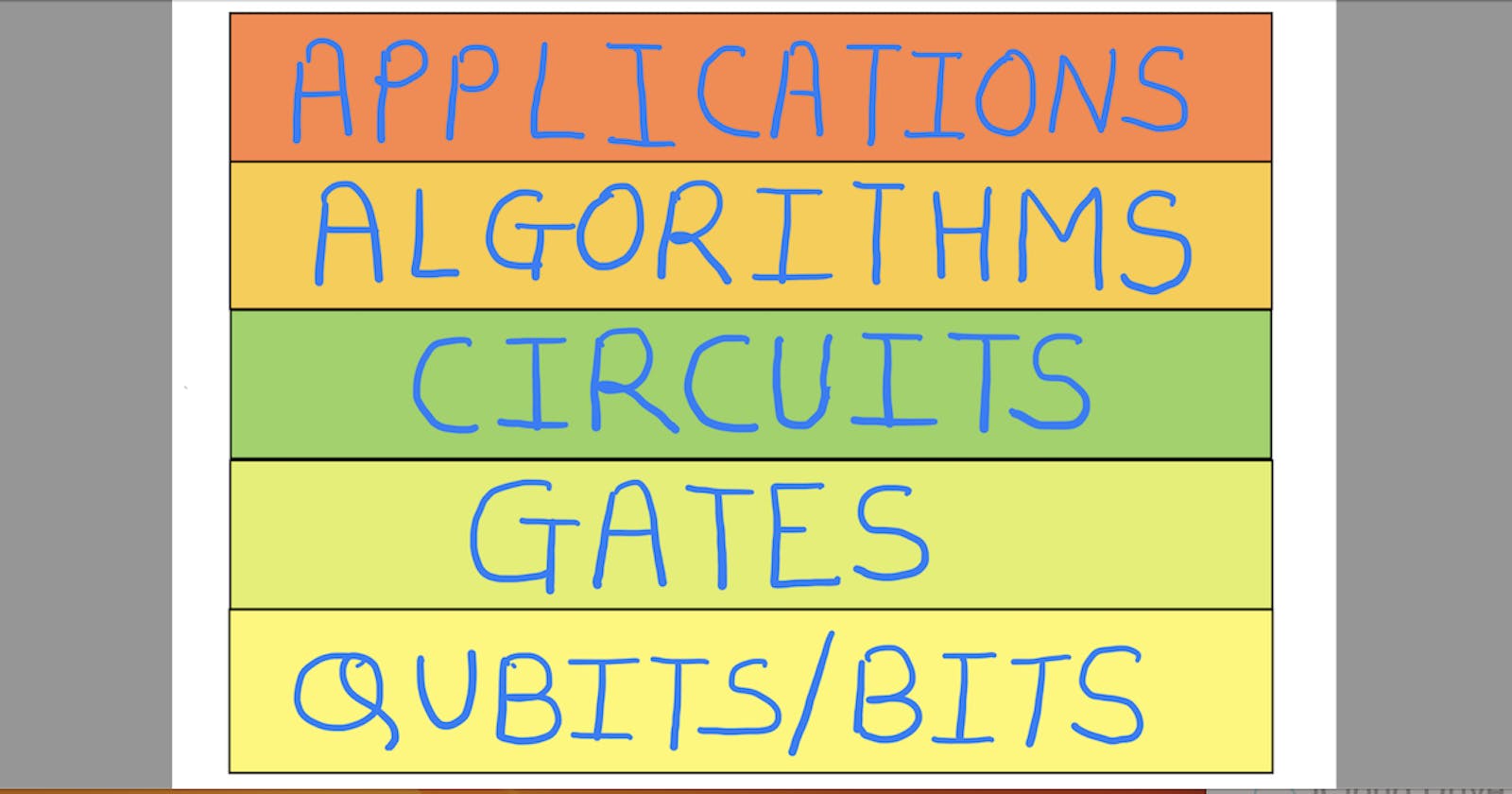'A journey of thousand miles begins with a single step'. But don't worry this is not a journey of thousand miles. It's just five steps. Five important steps or the important components of Quantum technology. You all are familiar with those components because they are similar to components of classical computing. Remember similar not same.
These 5 components of the Quantum technology are:
LEVEL 1 (Bricks: Basic Unit):
Qubits
Bits
LEVEL 2 (Giving different shapes to bricks or manipulating them according to needs):
Quantum Gates
Classical Gates
LEVEL 3 (Arranging bricks to make a wall):
Quantum Circuits
Classical Circuits
LEVEL 4 (Combining walls to make rooms):
Quantum Algorithm
Classical Algorithm
LEVEL 5 (Combining rooms to make beautiful houses):
Quantum Applications
Classical Applications
It's as easy as adding a 'Quantum' or 'Classical' word as a prefix but it's not. Purposely it's called Levels because each level is a foundation of the successor. Whether it's classical or quantum the interpretation is the same.
Gates manipulates the Basic unit
Circuits are made by combining gates
Algorithms are made by combining circuits
Applications are made by combining algorithms
The difference between classical and quantum technologies is their usage. When we utilize any application in classical computing we don't worry about the underlying technology like how bits are represented physically, how gates manipulate bits, how circuits are made or how algorithms work behind. 'No one thinks about how many AND gates or OR gates are running in our local machine when we are watching our favorite web series on Netflix. But if someone is thinking about it then that person is a prodigy.' Hence LEVEL-5(Application level) is important for all engineers and researchers in classical computing.
But while building quantum applications we have to take care of the number of qubits, the hardware we use, and the gates which has different decoherence and relaxation time(Don't worry about these terms. These are some jargon that you will know when you will dive deep into the subject), the practicality of the algorithm etc. All LEVELs are yet to be developed by engineers and researchers in quantum computing.
Let's discuss some terms and give some examples:
1) Bits: Basic unit of information whose value can be 0 or 1. Everything that you see, use or build in the classical computer is just a combination of bits. e.g. A single pixel is just 1-bit storing value 0(black) or 1(white). Physically they use transistors and a bit is just the presence or absence of electricity.
2) Qubits(Quantum Bits): Basic unit of information on a quantum computer. There are different modalities of qubit. e.g. Superconducting qubits, Photonic qubits, Trapped Ions etc. It is not clear which is the best.
3) Classical Gates: Few examples of classical gates are : AND gate (Outputs 1 when both inputs are 1), OR gate (Outputs 0 when both inputs are 0), NOT gate(Inversion gate)
4) Quantum Gates: Few examples of quantum gates are : X gate(Inverting quantum qubit), H(Hadamard) gate(Putting qubit in superposition), CNOT gate(entangling 2 qubit gate. Inverts target qubit when control qubit is in state 1).
5) Classical Circuits: e.g. Transistor as a switch, Operation Amplifier etc.
6) Quantum Circuits: e.g. Bell state (Entanglement) circuit, Controlled Gate circuits etc.
7) Classical Algorithms: These algorithms are used at compiler level(Parsing grammar of an automata), applications level(e.g. Bread First Search) etc.
8) Quantum Algorithms: Grover's algorithm(Unstructured Search), Shor's algorithm(Prime Factorization algorithm) etc. If Shor's algorithm can be run practically then good bye to all the current cybersecurity algorithms. But no need to worry. If you are a student now then by the time Shor's algorithm will become practical you might have turned into a grandparent. Congrats!
9) Classical Applications: Facebook, Amazon, Google, Instagram, Netflix etc.
10) Quantum Applications: Simulating chemical structures, Simulating quantum mechanical systems, Knowing the mysterious truths of nature etc.
Conclusion:
All levels of the Quantum technology are yet to be developed and we don't know what advantage it can give to the current technology. Quantum Technology can open opportunities from diverse background including Software (Coding languages like IBM Qiskit, Google Cirq), Hardware(Use of Josephson Junction and Microwave pulses in Superconducting qubits and a lot more), Cryogenic Refrigerator designers etc. Its not just a journey of 5 steps. Really it is a journey of 1000 miles.
